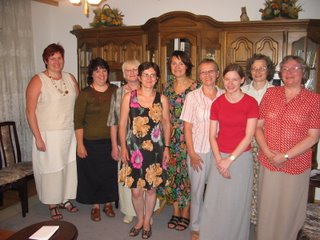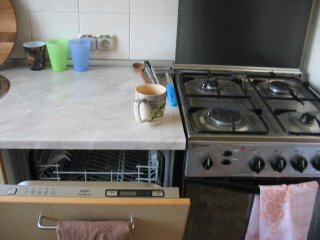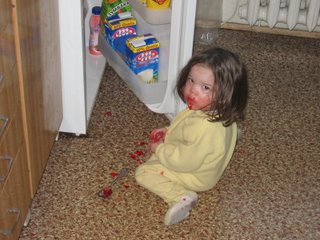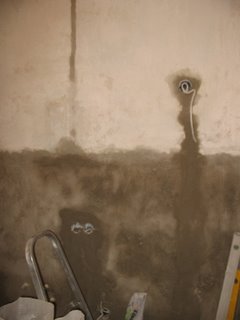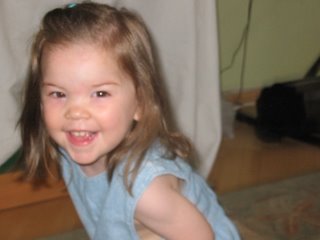Miss Clare Remembers by Miss Read--I love every "Miss Read" book I have ever read. I was fortunate to pick up a couple of them at a flea market last year in the States.
The Chosen by Chaim Potok--My second of Potok's novels. I enjoyed this on so many levels. I am looking forward to reading it again. I love an author who can take ordinary people and make you see how extraordinary they are. (Betty Smith is a master at this.) I've already loaned the book away to a reading friend in another part of Poland.
Emma by Jane Austen--a reread, of course. I reread all of Jane Austen's novels every year. I've been doing it for years, and I don't know when I will stop. Not many books could bear this much rereading, so consider it a testimony of the greatness of Jane Austen. One of the results of this rereading is that when I read Jane Austen fan-fic, I recognize
every single phrase that has been "borrowed" from the original books.
The Cereal Murders by Diane Mott Davidson--another reread, because I can only allow myself to read so many of my new books every month, and you can see at the beginning of the list that I indulged in two right away. When I need light reading, I like mysteries, and and these mysteries come with recipes. Diane Mott Davidson is not a "great" author in any sense of the word, but she is one of my favorite "fluff" authors.
"The Flying Stars," "The Invisible Man," and "The Honour of Israel Gow," by G.K. Chesterton--still more "Father Brown" stories from my
Complete Father Brown book. (The Israel Gow story was odd--very odd.)
Climbing Parnassus by Tracy Lee Simmons--I don't want to say too much about this. I agree with so much of what he has to say, but I believe deeply that he is mistaken about the formative nature of merely learning Latin and Greek as languages. He gives an example of all that you have to know in order to understand a two-word Latin sentence, but...I can make the same sentence in two Polish words. My point being, Polish people (as well as Russians and others) study and speak highly inflected languages. It does not enlarge the soul. And Simmons knows that's what classical education is about: "He must cultivate within himself the
habitual vision of greatness and the
conscious ideal of human perfection." (emphasis his)
Anielka by Bolesław Prus--I already made an entry about this, but I repeat here--eight chapters (half the book). Being able to read this matches everything else on the list this month, and I don't even like the story. But I can read Polish!
A Tale of Two Cities by Charles Dickens--I finally finished this one--hurrah! I must have read 3/4 of the way through the book before I was finally caught up in the story and read straight through to the end. I have made it a practice for several years to read one new (to me) novel by Dickens each year. Next year will either be
The Old Curiosity Shop or
Pickwick Papers. I must add that this is not at all a favorite of mine. This was a first read for me, but I think it would be a shame to make this the first Dickens assigned to students anywhere. It's so depressing. Also, I anticipated the ending (not sure if Dickens meant that to happen or not) so the suspense was spoiled.
Confessions, Book One, by Augustine--This was a reread, but I was focusing largely on his opinions and attitudes towards his education.
Ender's Game, by Orson Scott Card--another reread. I don't love the science fiction genre any more than I love fantasy, but a well-written book with excellent characters is worth reading no matter where or when it is set. The Ender series is so full of philosophy and moral dilemmas that I find it intriguing.
Miss Pym Disposes, by Josephine Tey--another reread. I seem to have done a lot of rereading of light fiction this month. Chalk it up to the heat, which has finally arrived.
The Literary Discipline, by John Erskine--This is a book of essays on literature. Pardon me if I can't resist quoting something he says which refutes the premise of
Climbing Parnassus."Much as we may dislike literature in translation, it is perhaps salutary to remember that literary masterpieces must survive in translation or not at all. In what language were the parables spoken? If Homer were not Homer still in English or French or German, how much of Homer would the world know?" I haven't read all the essays yet, of course, but I love the book because the previous owner left it full of penciled comments--just like me!
Murder is Easy by Agatha Christie--I don't think I've read this one before! I found it in a bookstore at the mall, when I needed something to read at lunch and had forgotten to bring something with me...(The bookstore didn't have a large English selection, so it was pretty much a choice between Agatha Christie and Dan Brown. No contest...)
The Bible and the task of teaching by David I. Smith and John Shortt--I already wrote about this a few posts ago, too. I don't often do this, but as soon as I finish this book (I'm on the last chapter), I am immediately going to reread it, more slowly this time. I flew through it the first time because I just wanted to know everything it said. Now I want to read more slowly and think about it. (By the way, the odd capitalization in the title is really the way the book is titled. My dh says that's to emphasize the word "Bible." I find it disturbing, but there it is.)
War and Peace by Leo Tolstoy--I put this last on the list, but I won't say too much because it deserves an entry of its own, to be forthcoming later this month. This is my summer reading project, and so far I've read part one of Book I--that's about 1/10 of the 1400+ page book--plus a few chapters of part two. So far, I've found this a very engaging book.
I probably read bits and pieces from some other things, but I can't remember--I've really been focusing on 2-3 books at time because I was having to "make" myself read them. When I look at this list, it looks like a lot of reading in June, but I read fast (too fast, except for the Polish reading).
Now that July has arrived, I can dip into my "new" books. Jostein Gaarder's latest is calling my name, I'm definitely going to delve further into the Erskine essays, Tolstoy requires constant attention, and I will complete
Anielka and select a new book to read in Polish. I really want to read Barzun's
Dawn to Decadence, but I can't see starting a book of that size while reading
War and Peace at the same time, so that will have to wait. Decisions, decisions...


